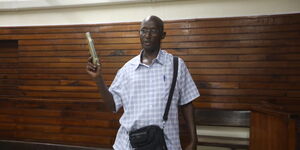The Rural and Urban Private Hospitals Association of Kenya (RUPHA) has raised alarm over what it terms a worrying lapse in the Social Health Authority (SHA) system.
According to the lobby, some hospitals previously suspended from the SHA portal over fraud-related investigations and compliance breaches have been quietly reinstated.
In a statement issued on Thursday, RUPHA alleged that in the past 24 hours, facilities blacklisted for fraudulent activities regained access to the portal due to what officials described as a “system bug”.
''Over the last 24 hours, all facilities that had been suspended from accessing the SHA portal due to either fraud investigations or compliance concerns have had their access to the portal reinstated due to a system bug affecting the SHA system,'' RUPHA claimed.
RUPHA further indicated that allowing questionable facilities back into the system without proper vetting could expose patients to unregulated services and derail the war against fraud in the sector.
SHA Response
SHA had not issued a response to the claims by the time of publishing. Attempts to get a comment from the authority were unsuccessful, as a representative stated they would need more time to look into the matter.
Last month, Kenyans raised mixed reactions to several health facilities that fraudulently claimed funds from SHA under the guise of service delivery.
The claims come at a time when the SHA is already under scrutiny following transition challenges from the defunct National Health Insurance Fund (NHIF), with hospitals and patients raising concerns over delayed payments, some hospitals claiming more than the services offered, and access to services.
In August, the Ministry of Health noted that fraudulent practices in the healthcare sector were a growing global challenge, accounting for up to 15 per cent of expenditures.
Health Cabinet Secretary Aden Duale announced that a crackdown had already seen the closure of 728 non-compliant facilities and the downgrading of 301 others by the Kenya Medical Practitioners and Dentists Council (KMPDC).
He admitted that investigations have uncovered disturbing trends, including upcoding, falsification of medical records, converting outpatient visits into inpatient admissions, and phantom billing for non-existent patients.
In June, SHA also suspended 40 facilities following forensic audits and announced plans to degazette an additional 45 flagged for fraudulent activities.












